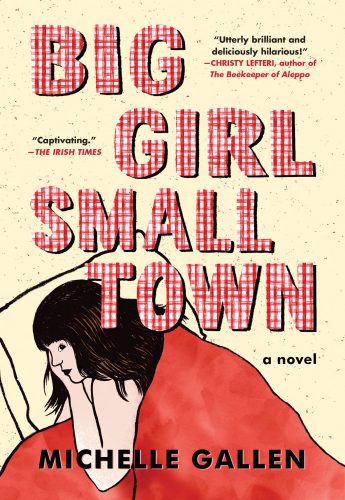Book Review: “Big Girl, Small Town” – Vinegary Vignettes
By Melissa Rodman
This novel’s greatest strength is its frank character sketch of Majella. The protagonist is sharply rendered through her observational, sensory navigation of the people and doings in the fictional Northern Ireland town of Aghybogey.
Big Girl, Small Town by Michelle Gallen. Algonquin Books, 320 pages, $16.95.
Buy at Bookshop

Michelle Gallen’s debut novel, Big Girl, Small Town, has the makings of a screenplay waiting for the right producer. Much of the text unfolds in candid dialogue; the characters are sharply drawn and ready for a casting call; and the b-roll of Aghybogey, the fictional Northern Ireland town where the novel is set, practically films itself. Two comparisons mentioned in early reviews and promotional materials — the sitcom Derry Girls, which also is set in Northern Ireland, and the Irish novelist Sally Rooney, whose Normal People was brought to the small screen on both sides of the pond in April 2020 — bolster my suspicions. In fact, Derry Girls actor Nicola Coughlan narrates the Big Girl, Small Town audiobook. So it should come as no surprise to find that Lookout Point recently optioned Gallen’s novel for television.
Big Girl, Small Town’s episodic structure — a week’s worth of impressionistic scenes featuring Aghybogey and its residents, as viewed and evaluated by protagonist Majella O’Neill, largely from behind the local chip shop counter where she works — cries out for visual expression and serialization. We hear Majella and the assorted customers with whom she does not want to engage extensively: “‘ — What can ah get chew?’ ‘ — Big bag a chips with salt ann vinegar ann red sauce please.’ Majella tingled with satisfaction as she heard the crackle and spit of the first basket of chips going down.” We see the town through Majella’s likes and dislikes, which are itemized as section headings, each characterizing the day’s diary of time-stamped vignettes.
The rhythms of Aghybogey have been shaped by the Northern Ireland conflict (a commonality between Gallen’s novel and Derry Girls), with the plot points of Majella’s own life inserted like clothespins along the unspooling of day-to-day narrative. Majella grew up during the Troubles and understands her town is full of “unwritten rules that everyone just seemed to know,” Gallen writes, “like which pub to drink in, which streets to avoid walking down, which pharmacy to get your pills from, what religion to marry.”
When not at the chipper (wryly called A Salt and Battered!), Majella, now in her late 20s, lives with and attends to her mother, an alcoholic whose self-sufficiency has dwindled in the wake of Majella’s father’s disappearance years before. This unsolved vanishing is not the first trauma to shake this family — Majella’s uncle Bobby was killed accidentally while planting a bomb against the Brits — nor is it the last. In the novel’s first pages, Majella and her mother are watching a news report on the recent, violent murder of her grandmother and the ongoing investigation. This death, like the previous O’Neill family incidents, adds grist to the small town’s churning gossip mill, which Majella keeps tabs on during her late-night shifts. Casual plot points like these, as well as an abrupt ending, reflect the novel’s ambience — relaxed rather than urgent, its narrative focus on the flow of customers, town life, and conversation.
The novel is propelled by Majella’s knack for minutiae and unfiltered observation, which stems directly from Gallen’s own. In an article for the Irish Times, Gallen notes, “Majella feels different to other people but she does not know she is autistic.” Gallen adds, “I guess I identify with ‘oddball’ narrators because I’m not neurotypical. A brain injury in my early 20s left me with a range of deficits that mean I experience many of the sensory issues that challenge Majella: I cannot filter lights, sounds and smells. I can end up overwhelmed in busy environments. My brain has no ‘off’ switch – I’m wide open to the tiniest and most beautiful or repulsive details in my line of sight and get exhausted processing everything.”
Gallen’s frank character sketch of Majella is the book’s greatest strength, conveyed through the young woman’s particular sensory navigation of the town’s people and their doings. Big Girl, Small Town‘s language, with its detailed evocation of sound and action, infuses the story’s candid protagonist and the characters around her with life. The television series production team has plenty of raw material to work with. Let’s see if it will be able to capture the vim and vigor of Aghybogey.
Melissa Rodman writes on the arts, and her work has appeared in Public Books and the Harvard Crimson among others.
